Femia > Health Library > Getting Pregnant > Planning pregnancy > My husband takes testosterone injections. Can I still get pregnant?
My husband takes testosterone injections. Can I still get pregnant?
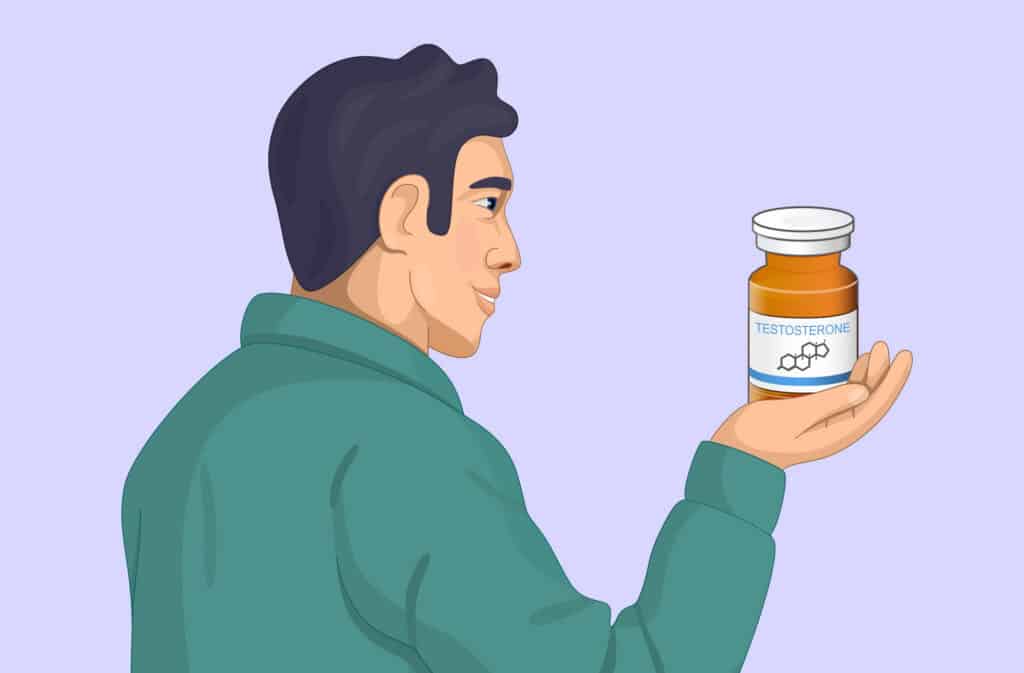
- Updated Mar 2, 2025
- Published
CRAFTED BY HUMAN
Crafted by human At Femia, we provide accurate and up-to-date information at every stage of your journey, from trying to conceive, pregnancy and postnatal support. All content is created by a real person based on in-depth research and own professional experience. Femia ensures that you will receive expert advice, strict accuracy and a personalized approach from our authors/medical experts. Learn more about our editorial policy.
FACT CHECKED
Fact checked At Femia Health, we maintain the highest standards of editorial excellence in delivering content focused on helping you conceive, guiding you through pregnancy, and supporting you postpartum. Explore our content review principles to learn how we ensure the accuracy and quality of our health and lifestyle tips for every stage of your journey.
Testosterone replacement therapy (TRT) may reduce sperm count in men. This may cause difficulties for couples looking to conceive. If you are planning a pregnancy, it might be helpful to consider alternative ways to boost testosterone levels or support your husband’s fertility using ancillary drugs.
“My husband takes testosterone injections. Can I still get pregnant?” This question bothers many women whose partners are on testosterone injections. We believe it’s good to understand the effects of TRT on fertility for couples trying to conceive in order to address the potential challenges and increase the likelihood of pregnancy. This guide will address the most common questions and help you understand the effects of testosterone therapy on conception.
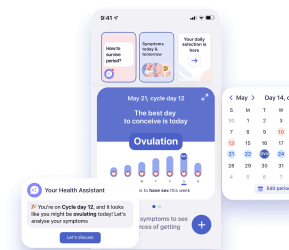
What is TRT?
Testosterone replacement therapy (TRT) is a treatment that restores testosterone levels in men and women whose levels of this hormone are below the norm. In men, testosterone is a crucial part of the reproductive system. It is produced in the testicles and is responsible for sperm production, muscle mass, strength, fat distribution, bone mass, libido, and red blood cells production.
The condition responsible for insufficient production of testosterone is called hypogonadism. This state occurs in men naturally as they age and can manifest in the following symptoms:
- Sparse body and facial hair
- Less frequent spontaneous erections
- Low libido
- Extra weight
Millions of Americans receive therapy to address their hormonal level decline, making TRT a common treatment in the modern world. Research suggests that one in four men over 30 years of age are affected by low testosterone levels.
Men receiving testosterone replacement therapy often report better mood, energy levels, and sex drive thanks to their treatment. Still, there are common concerns about the effect of this treatment on male reproductive ability.
👉Find out more: How to get pregnant with poor sperm morphology?
@femia.fertility Did you know that sperm can survive in the uterus for some time? It can remain viable and potentially meet the egg if unprotected intercourse occurs within 5 days prior to ovulation. Missing this window reduces conception chances, so timing is key. Which methods of tracking ovulation do you prefer? #CutMeme #ryangoslinglaughing #ttc #ovalation #conceiving #gettingpregnant ♬ original sound - Femia fertility tracker
Does TRT make you infertile?
Testosterone is a crucial hormone in males. It regulates a variety of bodily functions, including cardiovascular and metabolic features, mental well-being, and bone and muscle mass. Maintaining a balanced level of this hormone is necessary for maintaining a healthy mind and body throughout the years.
Testosterone is also a critical hormone for male sexual function and can enhance it. At the same time, it may have a negative impact on fertility.
How does testosterone affect sperm? Sperm production is a crucial part of male reproductive function. It works based on two core hormones:
- Luteinizing hormone (LH) stimulates testosterone production, which is crucial for sex drive, strength, bone mass, fat distribution, muscle mass, and red blood cell production.
- Follicle-stimulating hormone (FSH) determines the number of Sertoli cells, stimulates sperm production, and helps maintain its regularity.
When testosterone levels are increased with TRT, it may have an adverse effect on levels of FSH, which may interfere with the normal hormonal balance and suppress sperm production. Some men who desire fertility might not want to use testosterone, as it frequently acts as a contraceptive, meaning that it can decrease sperm count and make conception difficult.
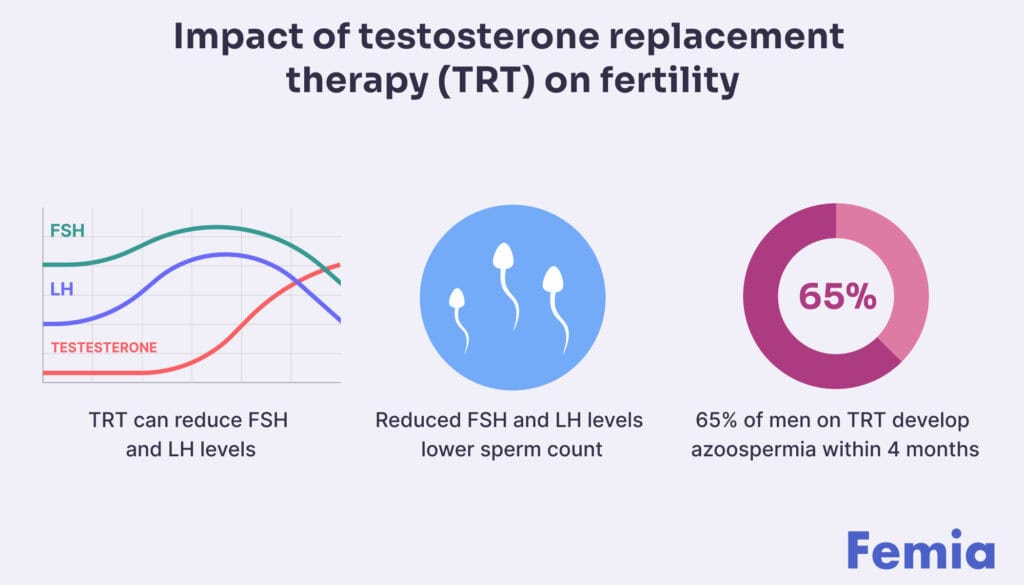
How quickly does TRT impact fertility?
While exploring effective ways to regulate male fertility, the World Health Organization found that using testosterone as a contraceptive can result in azoospermia in 65% of men (with previously normal sperm tests) within 4 months. This is a generalized figure. Please note that the time and severity of TRT’s impact can depend on a majority of factors, including a man’s age, pre-therapy test results, type of testosterone consumption, dosage, etc.
Is the impact of TRT on fertility permanent?
If your husband is on testosterone injections or considering receiving them while you still might want to conceive in the future, the next logical question is, does testosterone make you infertile permanently or not?
Studies indicated that only a small percentage of males (up to 10%) can remain infertile after they stop taking TRT. In most cases, the effects of testosterone injections are reversible.
How quickly does fertility recover after TRT?
According to studies, the average time for hormonally-induced azoospermia reversal is 8.5 months. However, the timing can be both smaller and larger. The probability of spermatogenic recovery after hormonal male treatment is in 67%, 90%, 96%, and 100% of men at 6, 12, 16, and 24 months after treatment discontinuation.
The recovery time also depends on a number of factors, such as a male’s age and the duration of testosterone intake.
What to do before starting TRT
If your husband is just considering starting TRT and you both are concerned about the question “Does testosterone make you sterile?”, there are two steps you can take before your partner gets TRT to increase your odds of having a baby:
- Consider getting basic sperm tests. Your medical provider can help you identify your husband’s baseline sperm count, its viability, and the cause of his low testosterone. Based on the test results, a specialist will suggest the most suitable way to address low testosterone levels while meeting your needs and ensuring that you will retain the ability to conceive without difficulty.
- Consider cryopreservation. Freezing your partner’s sperm might be a good backup plan to conceive a baby if your husband faces difficulty with fertility while on TRT. After a series of tests, your healthcare provider might offer to freeze at least two samples that will remain viable indefinitely, as long as stored properly. Pro tip: If you decide to take this route, consider storing your husband’s samples with several different companies to ensure their safety and eliminate potential mishaps.
Starting testosterone replacement therapy is not recommended without prior consultation with a doctor. So, if you are just planning TRT for your partner, a good starting point might be the office of your healthcare provider and a discussion of your long-term parenting goals. A good specialist should be able to direct you to all necessary screenings, help find the most suitable therapy, and offer opportunities for mitigating the possible fertility challenges.

Managing fertility while on testosterone therapy
After consulting with a doctor and otherwise preparing for therapy, here are some medication options to consider that stimulate endogenous testosterone production and help prevent infertility:
- Human Chorionic Gonadotropin (HCG)—HCG therapy was initially used to treat female infertility, until it was linked to a powerful testosterone-releasing effect with no negative impacts on fertility. It can stimulate endogenous testosterone production in patients with secondary hypogonadism and helps protect (or mitigate) the impact of exogenous testosterone that may result in poor sperm production.
- Aromatase inhibitors (AIs)—AIs have been used to treat male infertility for many years. Estradiol produced through the aromatization of circulating testosterone in adipose tissue in men regulates the gonadal axis functions and spermatogenesis. Clinical studies confirm that AIs have the potential to increase testosterone and FSH production while also improving semen parameters.
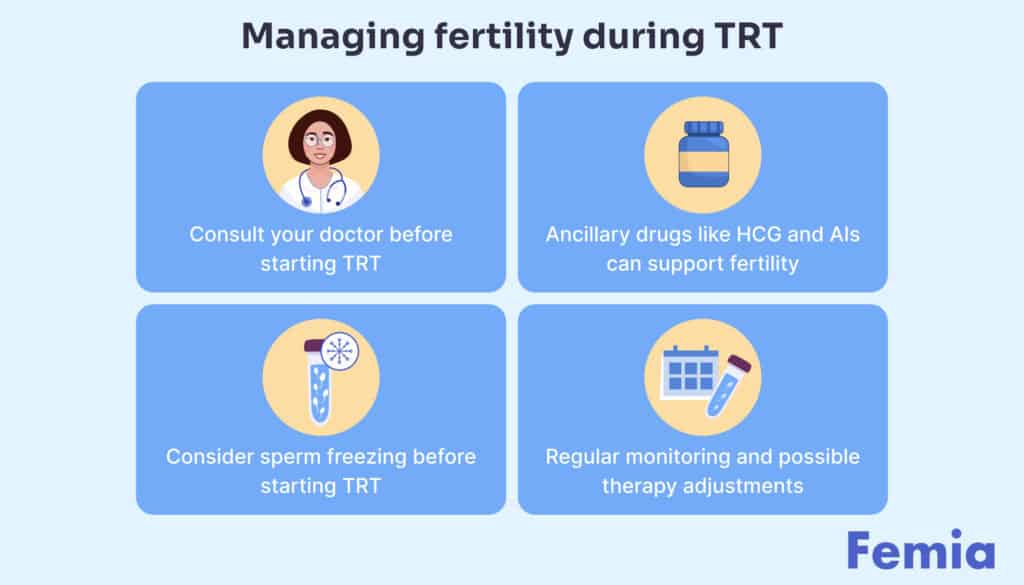
How to increase testosterone without affecting fertility
Here are some alternative paths that might suit your partner without affecting their reproductive systems:
- Non-pharmacological. Depending on the causes of low testosterone, certain lifestyle modifications can boost T levels without affecting fertility. The most common adjustments suggested by doctors include weight loss, a balanced sleep schedule, cessation of opioids/glucocorticoid medication consumption, stopping excessive alcohol/tobacco intake, and preventing diabetes development.
- Dopamine agonists. These are drugs that mimic the effect of dopamine. This key brain chemical is linked to the regulation of a wealth of body processes, including the cardiovascular system, endocrine system, reproductive system, and many others. Studies suggest that dopamine agonists inhibit prolactin and can potentially increase testosterone levels.
- Gonadotropins. This term spans all peptide hormones responsible for ovarian and testicular function. In humans, these hormones include follicle-stimulating hormone (FSH), luteinizing hormone (LH), and chorionic gonadotropin (hCG). Gonadotropin intake leads to a significant increase in testosterone in over 98% of cases, without harming fertility.
- Pulsatile GnRH therapy. This is a safe, alternative therapy aimed at activating the pituitary-gonadal axis. It boosts T levels while gradually increasing LH and FSH levels, mitigating the risks of infertility.
- Clomiphene citrate Tamoxifen. This is a fertility drug created to address infertility in both males and females. Clomiphene regulates the estrogen system, boosts testosterone levels, and prompts your body to produce more LH and FSH. It helps treat low T symptoms while also promoting sperm production and supporting fertility function.
Some of those alternatives might not work for your partner’s specific case, but there are options to consider.
The bottom line
Couples who are seeking to conceive a child while a partner is on TRT may face different doubts and concerns on their paths.
You’ve probably wondered“My husband takes testosterone injections. Can I still get pregnant?” The short answer to this question is “yes.” It’s technically possible to get pregnant when your partner is on testosterone injections. However, does testosterone affect sperm? The answer is also “yes.”
TRT can boost sexual drive and, at the same time, suppress other hormones (luteinizing hormone and follicle-stimulating hormone) responsible for sperm production. What’s more, the TRT’s effects on fertility may appear rather fast. Luckily, they are reversible in most cases, and there are also alternative paths to enhance testosterone levels without harming fertility.
Using a fertility tracking app can help you tracking ovulation. Consider consulting fertility specialists for personalized advice. A specialist should be able to help you identify the causes of low testosterone and suggest optimal ways to address the problem considering your future plans and goals.
References
- Snow L. “Hormone Therapy: Testosterone Replacement Therapy.” FP Essent. Aug. 2023. https://pubmed.ncbi.nlm.nih.gov/37603880/.
- Andre B. Araujo, Gretchen R. Esche, Varant Kupelian, Amy B. O’Donnell, Thomas G. Travison, Rachel E. Williams, Richard V. Clark, John B. McKinlay. “Prevalence of Symptomatic Androgen Deficiency in Men.” The Journal of Clinical Endocrinology & Metabolism, Volume 92, Issue 11, 1, Nov. 2007. https://academic.oup.com/jcem/article/92/11/4241/2598366.
- Harrison Wein. “Understanding How Testosterone Affects Men.” National Institutes of Health, 23, Sept. 2013. https://www.nih.gov/news-events/nih-research-matters/understanding-how-testosterone-affects-men#:~:text=In%20men%2C%20it%27s%20thought%20to,estradiol%2C%20a%20form%20of%20estrogen.
- Simoni M, Weinbauer GF, Gromoll J, Nieschlag E. “Role of FSH in male gonadal function.” Ann Endocrinol (Paris), Jul. 1999. https://pubmed.ncbi.nlm.nih.gov/10456180/#:~:text=Although%20the%20precise%20function%20of,maintenance%20of%20normal%20sperm%20production.
- Patel AS, Leong JY, Ramos L, Ramasamy R. “Testosterone Is a Contraceptive and Should Not Be Used in Men Who Desire Fertility.” World J Mens Health, Jan. 2019. https://www.ncbi.nlm.nih.gov/pmc/articles/PMC6305868/.
- “Contraceptive efficacy of testosterone-induced azoospermia in normal men. World Health Organization Task Force on methods for the regulation of male fertility.” Lancet, 20, Oct. 1990. https://pubmed.ncbi.nlm.nih.gov/1977002/.
- John Alden Lee, Ranjith Ramasamy. “Indications for the use of human chorionic gonadotropic hormone for the management of infertility in hypogonadal men.” Translational Andrology and Urology (Knowledge Gaps in Male Infertility), 24, Jul. 2018. https://tau.amegroups.org/article/view/19649/html.
- Bang JK, Lim JJ, Choi J, Won HJ, Yoon TK, Hong JY, Park DS, Song SH. “Reversible infertility associated with testosterone therapy for symptomatic hypogonadism in infertile couple.” Yonsei Med J. May, 2013. https://www.ncbi.nlm.nih.gov/pmc/articles/PMC3635615/.
- Liu PY, Swerdloff RS, Christenson PD, Handelsman DJ, Wang C; Hormonal Male Contraception Summit Group. “Rate, extent, and modifiers of spermatogenic recovery after hormonal male contraception: an integrated analysis.” Lancet, 29, Apr. 2006. https://pubmed.ncbi.nlm.nih.gov/16650651/.
- Kohn TP, Louis MR, Pickett SM, Lindgren MC, Kohn JR, Pastuszak AW, Lipshultz LI. “Age and duration of testosterone therapy predict time to return of sperm count after human chorionic gonadotropin therapy.” Fertil Steril, Feb. 2017. https://www.ncbi.nlm.nih.gov/pmc/articles/PMC5292276/.
- Ramasamy R, Armstrong JM, Lipshultz LI. “Preserving fertility in the hypogonadal patient: an update.” Asian J Androl, Mar-Apr. 2015. https://www.ncbi.nlm.nih.gov/pmc/articles/PMC4378070/.
- Yang C, Li P, Li Z. “Clinical application of aromatase inhibitors to treat male infertility.” Hum Reprod Update, 21, Dec. 2021. https://pubmed.ncbi.nlm.nih.gov/34871401/.
- Okun MS, Wu SS, Jennings D, Marek K, Rodriguez RL, Fernandez HH. “Testosterone level and the effect of levodopa and agonists in early Parkinson disease: results from the INSPECT cohort.” J Clin Mov Disord, 26, Nov. 2014. https://www.ncbi.nlm.nih.gov/pmc/articles/PMC4711001/#:~:text=Dopamine%20agonists%20have%20been%20used,testosterone%20levels%20by%20inhibiting%20prolactin.
- Alexander EC, Faruqi D, Farquhar R, Unadkat A, Ng Yin K, Hoskyns R, Varughese R, Howard SR. “Gonadotropins for pubertal induction in males with hypogonadotropic hypogonadism: systematic review and meta-analysis.” Eur J Endocrinol, 3, Jan. 2024. https://pubmed.ncbi.nlm.nih.gov/38128110/.
- Hao M, Mao JF, Guan QB, Tian L, Han H, Lei HE, Zheng DM, Tian ZH, Nie M, Wang X, Yu BQ, Gao YJ, Wu XY. “Efficacy and safety of pulsatile gonadotropin-releasing hormone therapy in patients with congenital hypogonadotropic hypogonadism: a multicentre clinical study.” Ann Transl Med, Jun. 2021. https://www.ncbi.nlm.nih.gov/pmc/articles/PMC8267282/.
- LiverTox: Clinical and Research Information on Drug-Induced Liver Injury [Internet], Bethesda (MD): National Institute of Diabetes and Digestive and Kidney Diseases. “Infertility Agents.” 19, Jul. 2017. https://pubmed.ncbi.nlm.nih.gov/31643631/.
- Ide V, Vanderschueren D, Antonio L. “Treatment of Men with Central Hypogonadism: Alternatives for Testosterone Replacement Therapy.” Int J Mol Sci, 22, Dec. 2020. https://www.ncbi.nlm.nih.gov/pmc/articles/PMC7792781.
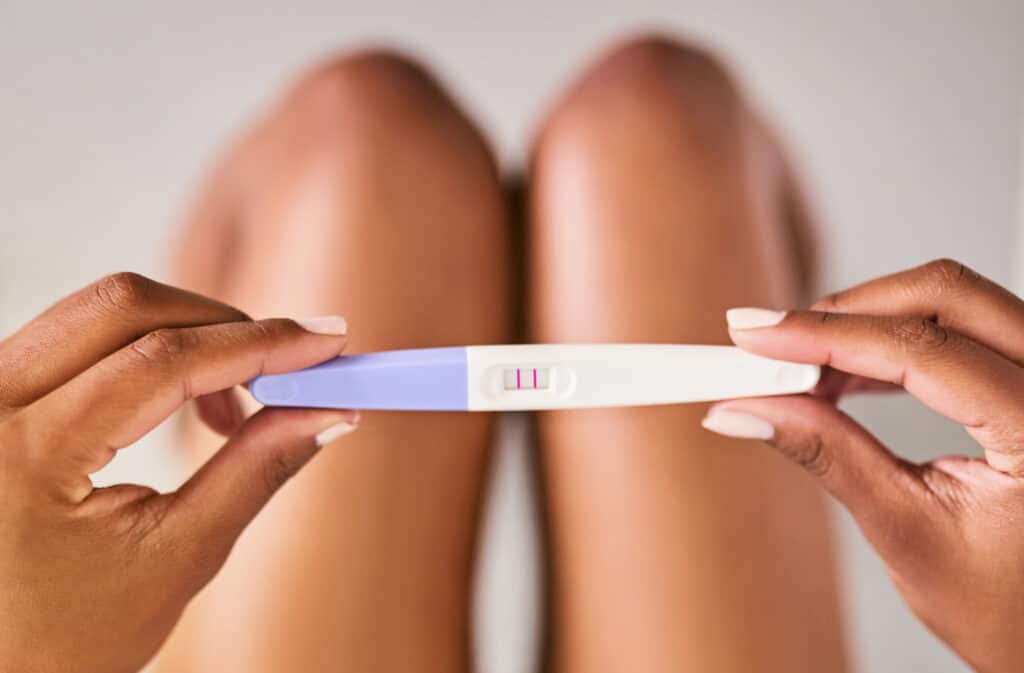
Learn the chances of getting pregnant after unprotected sex one time, factors affecting conception, and what steps to take next.
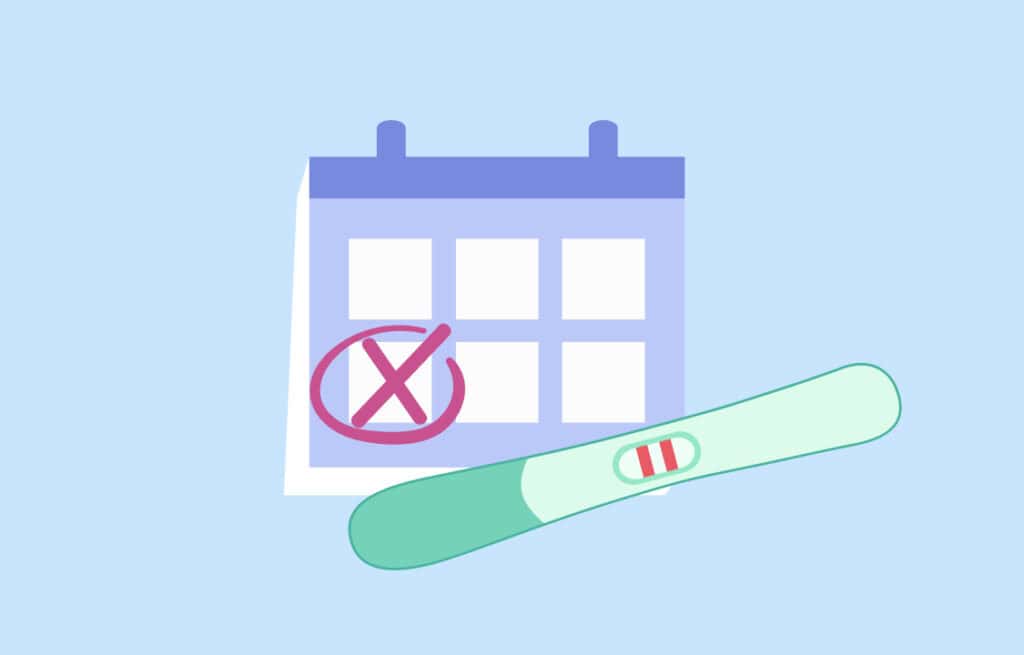
Learn about the process of implantation, discover the early signs, such as implantation bleeding and cramping, and how the hormone hCG becomes detectable soon after.
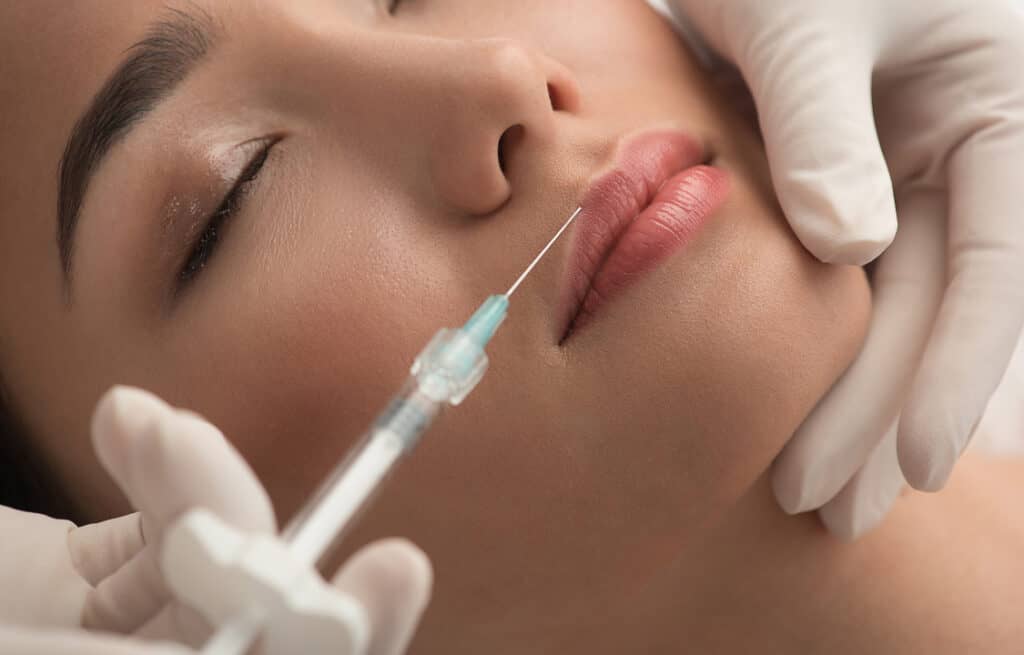
Pregnancy brings a fresh and vibrant glow from within – but it doesn’t do much for your lips. Let’s check if you can get lip fillers while pregnant.

